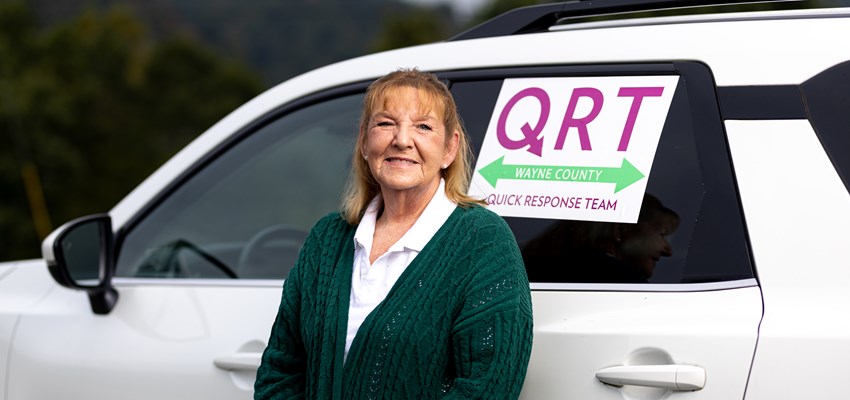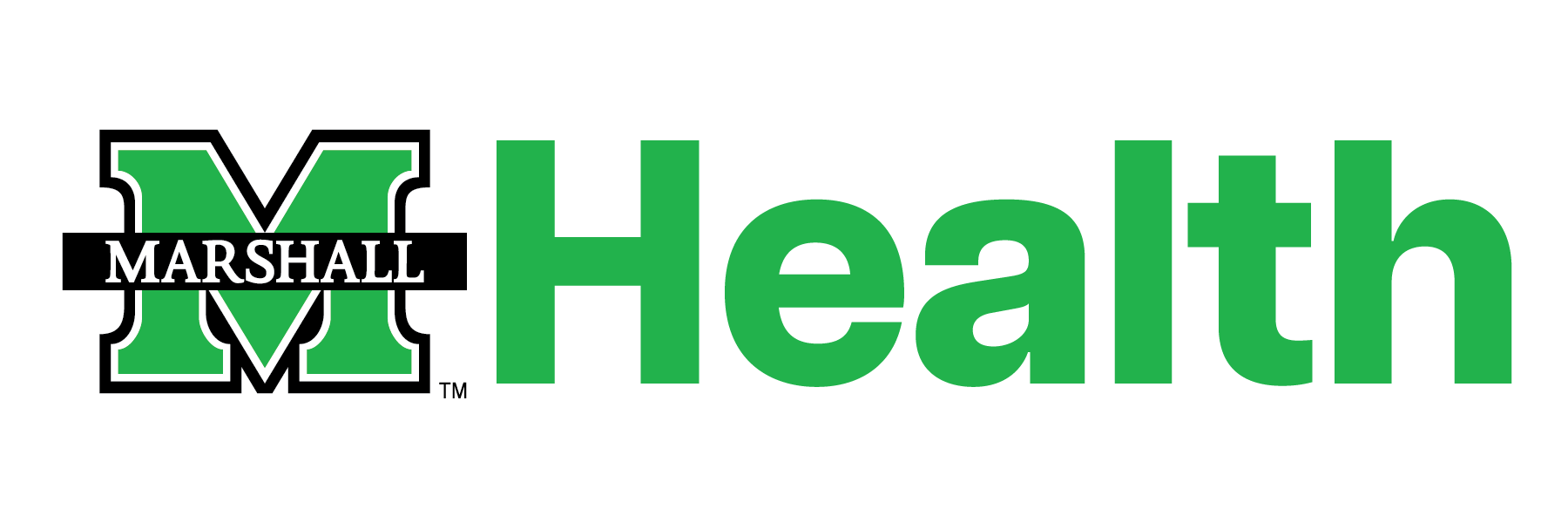Quick Response Teams
Marshall Medicine Moments

Dawn Streets spent 35 years as a paramedic in Wayne and Cabell counties. It was anything but a stress-free job. When she retired, she had every right to kick back and take a break. But she couldn’t. She had more lives to save.
What she did instead was become coordinator of the Wayne County Quick Response Team (QRT). It was one of three new QRTs that Marshall Health launched in 2021 in partnership with local organizations as part of Marshall Health’s Great Rivers Regional System for Addiction Care Initiative. The others are in Putnam and Mason counties. Between the three QRTS, they are making progress educating both substance-users and the public about the steps to getting help.
Today, Streets is getting the overdose treatment Narcan into the hands of every person who will take it and information about recovery options to those who have experienced an overdose. She’s also helping people with basic needs whenever she can.
“I pray it makes a difference,” Streets said. “I have lost family (to substance use). It’s heartbreaking, and I miss them every day. I have close friends who have had their children die. Those parents still grieve for those children they have lost. If I can prevent one death, it’s worth it.”
Quick Response Teams have operated in Huntington for several years. EMS, 911 and the Overdose Survivor Outreach Program give addresses and phone numbers of those who have overdosed to people like Streets who seek out those individuals to discuss their circumstances and recovery options in a non-threatening environment. In Putnam County, they go out on Thursdays alongside an EMS worker and a peer recovery coach or two.
They might go to the person’s house, or sometimes in Streets’ case, she goes to municipal court to introduce herself, give them her phone number, and let them know she’s there to help if and when they are ready.
“Substance use does not know any boundaries,” Streets said. “I’ve received referrals for 14- to 16-year-olds, and I think the oldest that we’ve had die of an overdose was in their 70s.”
The QRT team members stay busy. According to the state Office of Drug Control Policy, Wayne County alone had 118 EMS responses to suspected overdoses in 2023 and 28 so far in 2024. Putnam County has had 100 in 2023 and 48 in 2024. Mason County had 79 in 2023 and 16 in 2024. Statewide in 2024, there have been an estimated 1,400 overdose deaths reported in West Virginia for the year, though some of those reports are still pending. The good news is that the estimated overdose death rates have gone done by more than seven percent between May 2023 and May 2024.
An overdose is a frightening experience, Streets said.
“When someone overdoses, they get lethargic, pale, maybe sweaty, unresponsive and their skin changes color – it’s purple or blue around the lips and the nose,” Streets said. “If you can’t get them awake, you have to give them Narcan and you have to call 911 and get them help because they will die. Their breathing will stop, and then their heart will stop.”
For those who experience overdoses and get help from ambulances, that’s when QRTs can get involved.
“The whole premise of it is when there is an overdose in the county, and I get the information or someone calls and refers somebody, my responsibility is to take a team and go to that individual and have an honest conversation about what this individual is doing and try to get them to agree to go to a recovery program,” Streets said. “If they agree, we assist them with the paperwork, make the phone calls that we need to make and I’ll even transport them up there and help them get situated at that facility, or if it’s an outpatient program, to get them to call and make an appointment and I’ll call and take them to the appointment or help them to arrange other transportation.”
She also provides Narcan and examines the living conditions to see if they need food, utilities, warm clothing or even a home.
“Anything to try and help make their burden easier,” she said.
Many of them live in areas so far out in the hollers that she even wonders how they access drugs in the first place. Many are homeless, who couch surf, and several are living in abandoned properties.
“I’ve had some of these individuals thank me for being so kind to them, and it’s kind of heartbreaking,” Streets said. “Everybody deserves respect and kindness. I don’t care what you are and who you are, race, color, sexual orientation, I don’t care about any of that. You’re human. You deserve common courtesy, respect and kindness. That’s what I was always taught to believe and the way I was raised and it’s truly the way I feel.”
Tina Ramirez, program director of the Great Rivers Regional System for Addiction Care Initiative, said those who suffer from substance use disorder are “modern day leppers,” shunned because of fear and misunderstanding. While they launched the initiative hoping that every person would immediately seek recovery, they’ve come to realize it’s just as much about making sure they have food, shelter, Narcan and a phone number to call when they’re ready to seek help.
“It’s just important to have someone come and say, ‘Just checking to see if you need food. You’re not alone. We have more services now than ever before,’” she said.
It’s a roller-coaster of a job, but it’s worth it, the QRT team members say. Most of the time, she doesn’t go into homes but puts information in the mailbox or by the front door.
“It can potentially be a dangerous situation,” Streets said. “I’ve been run off with a knife. One time, when I had people with me, we came across someone with a shotgun. Now, once we talked to him for a few minutes, he turned out to be one of the nicest individuals you could ever want to talk to. … It was pretty intense when you’re standing there and someone is holding a shotgun. There have been three or four instances that could have turned out bad.”
It’s the ones that turn out well that keep her going. She remembers a woman who struggled for a long time, with whom she stayed in touch for months before a breakthrough.
“For 18 months, she was in my database because they found her over a hill or on the side of the road or in a doorway,” Streets said. She finally was ready for a program, starting with one in Williamson and then moving on to a longer-term program in Charleston, which helped her find a job and an apartment. She’s been clean and sober for a year.
“She still goes to meetings and is still doing well. They helped her turn her life around,” Streets said. “She told me that she was so thankful, and this past Christmas had been the first time in years that she had money to buy her children and grandkids Christmas gifts. She was so proud of herself and rightly so. I told her I was very proud of her.”
“I really think a lot of them don’t want to be in this situation. They just don’t know how to get out of this situation,” Streets said. “I think we make a difference because we’re that step that they can’t find. They just don’t know where to start. They are so miserable, and their minds are so incapacitated with everything that has gone on that they don’t know how to move forward, and they’re stuck in a rut. Everybody gets in a rut now and then, and it’s hard to get out. We are that step forward.”
Many individuals don’t accept help on the first contact. They might wait a couple days or several months, and even for those who go through a program, sometimes they fall back into bad habits and must start again and again and again. That’s a typical part of the process, Street said.
Amidst the individual cases, members of the QRTs also spend time trying to educate the community about the benefits of having Narcan on hand. Narcan is a treatment that can reverse an overdose and can be administered by anyone. Streets reports giving hundreds of doses away in sometimes just a few weeks.
“We do a lot of community outreach, where we set up all over the county and give out Narcan and information and fentanyl test strips,” Streets said. “Or I’ll go to a food bank, where they’re giving away food and just try to talk to individuals as they drive by to pick up food and introduce myself and do a quick rundown about Narcan and offer it to them for free … Some people know what it is. Some people still don’t know what Narcan is. Some people still say they don’t know anybody who is a substance abuse user. There is still a lot of stigma in Wayne County that we’re trying to overcome. People are ashamed if they have family members who use drugs, and they don’t want to tell you.”
Families are very important to recovery, according to Ramirez. “One of our QRT volunteers once said he considers family members the forgotten victims of the drug epidemic. He led a support group so families could share their experiences and feel less alone in their struggle.”
Streets thinks often of a friend from high school who lost a child to drugs.
“I couldn’t go to the funeral because I didn’t know what to tell my girlfriend. To this day, I regret it, that I didn’t know what to say to her. There was nothing,” she said. “I love her with all my heart, and it’s still hard to talk to her about her daughter. Now I do a lot of this with her in mind. I don’t want another parent to have to lose a child. I don’t want any child to have to lose a parent.”
Story by Jean Hardiman
Photos by Sholten Singer
